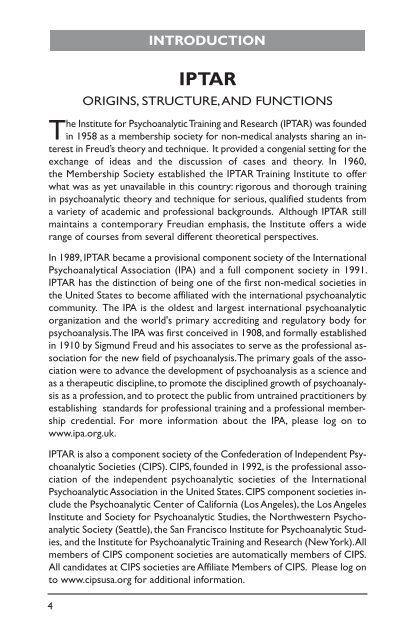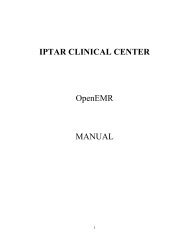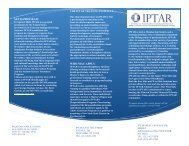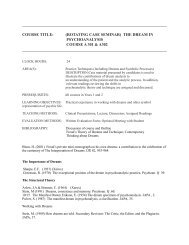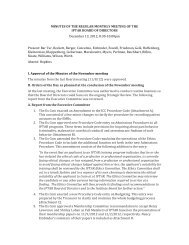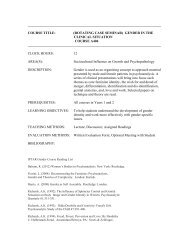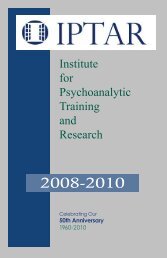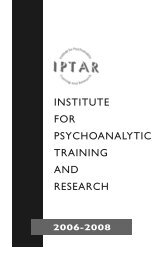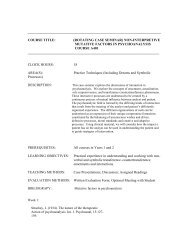IPTAR Bulletin - Institute for Psychoanalytic Training and Research
IPTAR Bulletin - Institute for Psychoanalytic Training and Research
IPTAR Bulletin - Institute for Psychoanalytic Training and Research
Create successful ePaper yourself
Turn your PDF publications into a flip-book with our unique Google optimized e-Paper software.
<strong>IPTAR</strong><br />
ORIGINS, STRUCTURE,AND FUNCTIONS<br />
The <strong>Institute</strong> <strong>for</strong> <strong>Psychoanalytic</strong><strong>Training</strong> <strong>and</strong> <strong>Research</strong> (<strong>IPTAR</strong>) was founded<br />
in 1958 as a membership society <strong>for</strong> non-medical analysts sharing an interest<br />
in Freud’s theory <strong>and</strong> technique. It provided a congenial setting <strong>for</strong> the<br />
exchange of ideas <strong>and</strong> the discussion of cases <strong>and</strong> theory. In 1960,<br />
the Membership Society established the <strong>IPTAR</strong> <strong>Training</strong> <strong>Institute</strong> to offer<br />
what was as yet unavailable in this country: rigorous <strong>and</strong> thorough training<br />
in psychoanalytic theory <strong>and</strong> technique <strong>for</strong> serious, qualified students from<br />
a variety of academic <strong>and</strong> professional backgrounds. Although <strong>IPTAR</strong> still<br />
maintains a contemporary Freudian emphasis, the <strong>Institute</strong> offers a wide<br />
range of courses from several different theoretical perspectives.<br />
In 1989, <strong>IPTAR</strong> became a provisional component society of the International<br />
<strong>Psychoanalytic</strong>al Association (IPA) <strong>and</strong> a full component society in 1991.<br />
<strong>IPTAR</strong> has the distinction of being one of the first non-medical societies in<br />
the United States to become affiliated with the international psychoanalytic<br />
community. The IPA is the oldest <strong>and</strong> largest international psychoanalytic<br />
organization <strong>and</strong> the world's primary accrediting <strong>and</strong> regulatory body <strong>for</strong><br />
psychoanalysis.The IPA was first conceived in 1908, <strong>and</strong> <strong>for</strong>mally established<br />
in 1910 by Sigmund Freud <strong>and</strong> his associates to serve as the professional association<br />
<strong>for</strong> the new field of psychoanalysis.The primary goals of the association<br />
were to advance the development of psychoanalysis as a science <strong>and</strong><br />
as a therapeutic discipline, to promote the disciplined growth of psychoanalysis<br />
as a profession, <strong>and</strong> to protect the public from untrained practitioners by<br />
establishing st<strong>and</strong>ards <strong>for</strong> professional training <strong>and</strong> a professional membership<br />
credential. For more in<strong>for</strong>mation about the IPA, please log on to<br />
www.ipa.org.uk.<br />
<strong>IPTAR</strong> is also a component society of the Confederation of Independent <strong>Psychoanalytic</strong><br />
Societies (CIPS). CIPS, founded in 1992, is the professional association<br />
of the independent psychoanalytic societies of the International<br />
<strong>Psychoanalytic</strong> Association in the United States. CIPS component societies include<br />
the <strong>Psychoanalytic</strong> Center of Cali<strong>for</strong>nia (Los Angeles), the Los Angeles<br />
<strong>Institute</strong> <strong>and</strong> Society <strong>for</strong> <strong>Psychoanalytic</strong> Studies, the Northwestern <strong>Psychoanalytic</strong><br />
Society (Seattle), the San Francisco <strong>Institute</strong> <strong>for</strong> <strong>Psychoanalytic</strong> Studies,<br />
<strong>and</strong> the <strong>Institute</strong> <strong>for</strong> <strong>Psychoanalytic</strong><strong>Training</strong> <strong>and</strong> <strong>Research</strong> (NewYork).All<br />
members of CIPS component societies are automatically members of CIPS.<br />
All c<strong>and</strong>idates at CIPS societies are Affiliate Members of CIPS. Please log on<br />
to www.cipsusa.org <strong>for</strong> additional in<strong>for</strong>mation.<br />
4<br />
INTRODUCTION<br />
<strong>IPTAR</strong> is both a Membership Society <strong>and</strong> a <strong>Training</strong> <strong>Institute</strong>. It is a community<br />
committed to the lifelong study of psychoanalysis. <strong>IPTAR</strong> offers its membership<br />
a rich variety of programs <strong>and</strong> opportunities <strong>for</strong> study, discussion, <strong>and</strong><br />
the continuing interchange of ideas. As a<strong>Training</strong> <strong>Institute</strong>, it offers a carefully<br />
planned curriculum governed by a contemporary Freudian perspective.<br />
Rooted in the original Freudian text, it also includes important elaboration<br />
<strong>and</strong> trans<strong>for</strong>mations of the original concepts that have led to today’s exp<strong>and</strong>ed<br />
underst<strong>and</strong>ing of psychopathology, development, technique, <strong>and</strong> application.<br />
Teaching is done in the context of clinical illustration, making<br />
theoretical learning relevant to actual practice.<br />
There are three separate Boards of Directors at <strong>IPTAR</strong>. The Society Board<br />
of Directors bears the ultimate responsibility <strong>for</strong> all activities at <strong>IPTAR</strong> <strong>and</strong><br />
appoints the other two Boards.The Board of Administrators of the <strong>Institute</strong><br />
carries out all training functions <strong>for</strong> the c<strong>and</strong>idates in adult psychoanalysis.<br />
This is the main training function that our Society provides. The <strong>IPTAR</strong> Clinical<br />
Center (ICC) Board of Directors is responsible <strong>for</strong> insuring that the ICC<br />
reaches its mission: to provide the community af<strong>for</strong>dable mental health services.<br />
Both c<strong>and</strong>idates <strong>and</strong> members work in the Clinical Center. Other educational<br />
groups report directly to the Society Board but often work in<br />
cooperation with the <strong>Institute</strong> <strong>and</strong> Clinical Center. Each Board has representatives<br />
on the other Boards to facilitate communication between them.<br />
In 2006, <strong>IPTAR</strong> was registered as a program leading to Licensure in Psychoanalysis<br />
by the New York State Department of Education (Office of the<br />
Professions). This is of particular importance to people from other than<br />
mental health disciplines who wish to become psychoanalysts. Upon<br />
graduation from <strong>IPTAR</strong>'s Adult <strong>Psychoanalytic</strong> <strong>Training</strong> Program, they will be<br />
eligible to sit <strong>for</strong> the Psychoanalysis Licensing Exam <strong>and</strong> become Licensed<br />
Psychoanalysts (LP) in New York State.<br />
<strong>IPTAR</strong> has offices on the Upper West Side <strong>and</strong> the Upper East Side of Manhattan.<br />
Our East Side location has private offices <strong>for</strong> rent <strong>and</strong> also provides<br />
space <strong>for</strong> the <strong>IPTAR</strong> Clinical Center. Our West Side location is <strong>IPTAR</strong>’s<br />
administrative center, housing the Edward Frankel Memorial Library, a conference<br />
room used <strong>for</strong> a variety of <strong>IPTAR</strong> events <strong>and</strong> programs, <strong>and</strong> private<br />
offices available <strong>for</strong> rent. Offices at both locations may be rented by people<br />
from outside or within the <strong>IPTAR</strong> community.<br />
<br />
5


